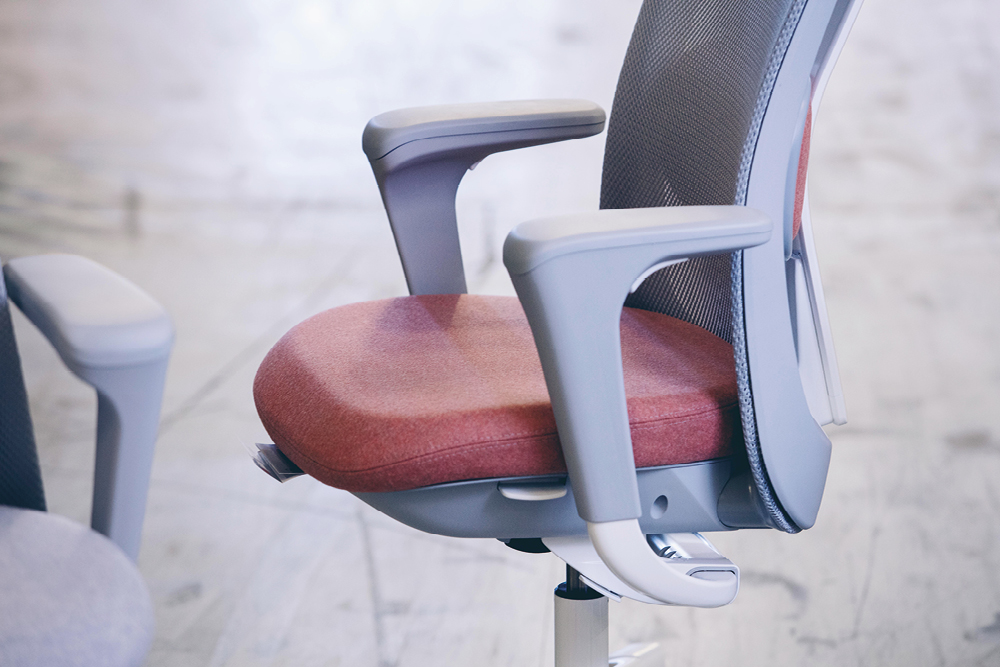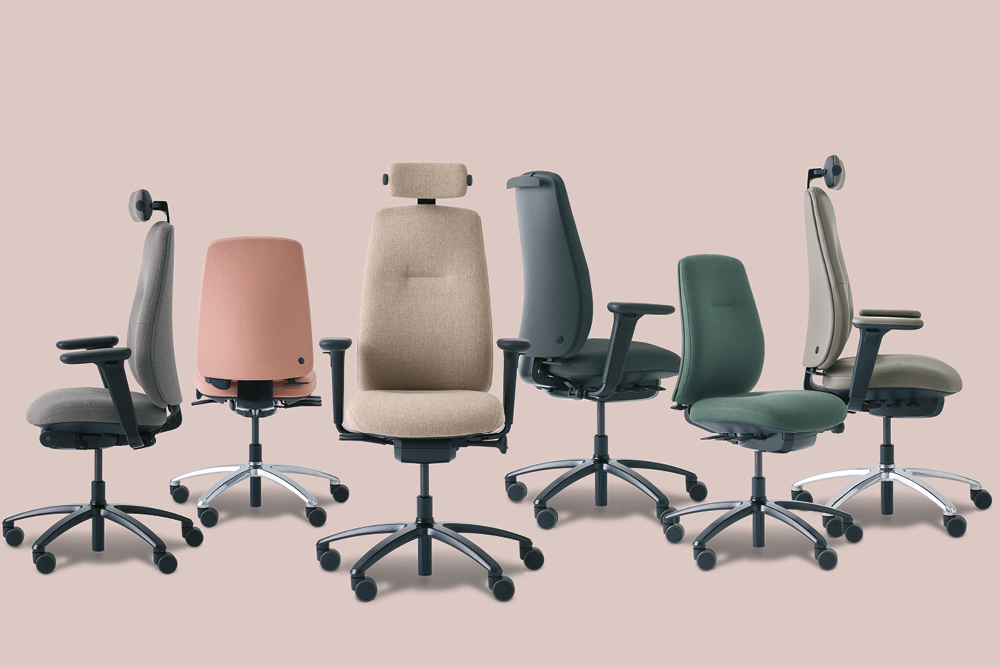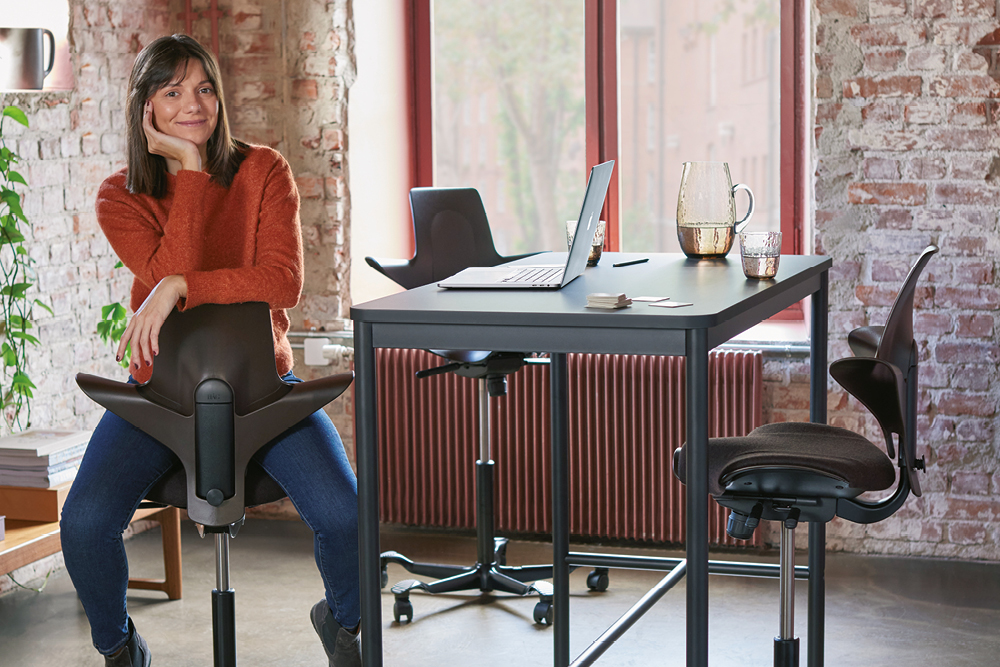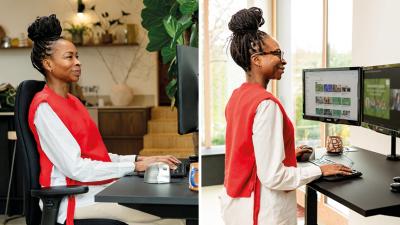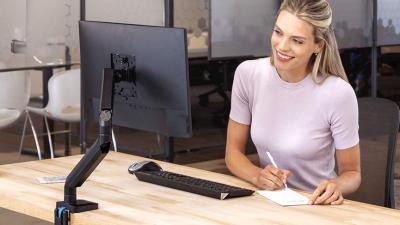If you’ve had the chance to plant your behind on a RH or HÅG chair by Flokk, you’ll know that these are among the most comfortable office chairs in the world. But can you do so with a clear conscience, knowing that you have purchased the furniture responsibly from a brand who takes care not to damage our fragile environment?
The answer is yes, because here I’ve interviewed the two influential team members at Flokk, the Norwegian furniture makers, pictured below. What comes across in spades from meeting Christian Lodgaard, Flokk’s Chief Design Officer, and Jane Thomson, Flokk’s Brand and Sustainability Ambassador, is their genuine commitment to protecting resources and nature for coming generations and genuine expertise in how to make sustainable furniture commercially viable.
“You need to be a little bit visionary and very stubborn. We leave no stone unturned in pursuit of our sustainable objectives” says Christian.
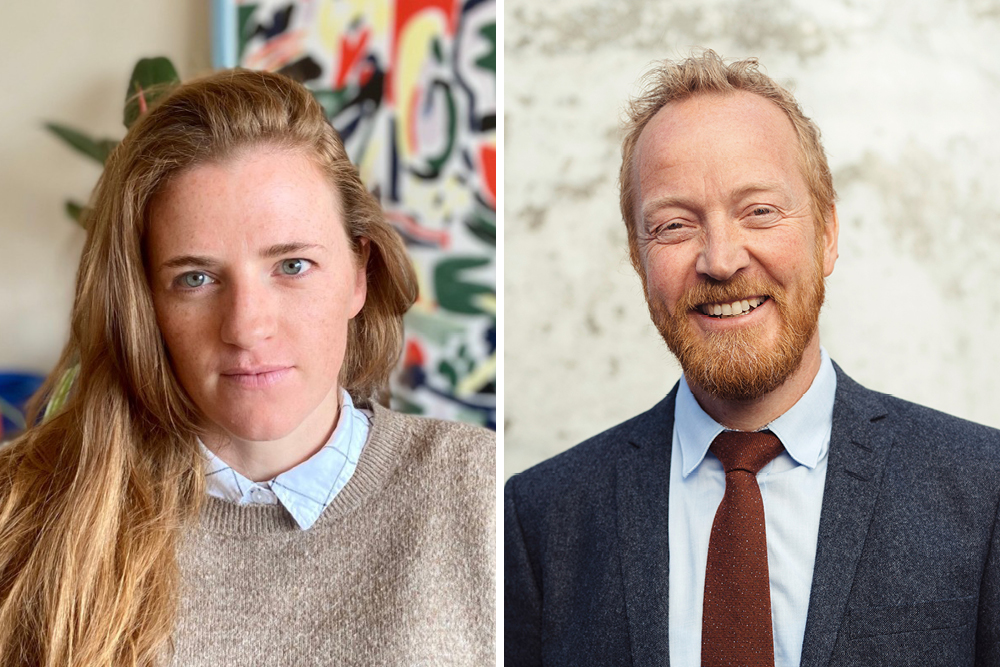
Flokk want us to love their furniture, and therefore want to keep it for years. Their HÅG and RH chairs in the Posturite shop are built for long-term use, encouraging consumers to eschew poor quality alternatives which create waste and end up being a false economy.
Every decision during their furniture design process ensures that their seating:
- Is low weight
- Has few components
- Is made with the right materials
- Has a long lifespan
- Is designed for disassembly
Flokk call this their ‘Five Circular Design Criteria’. Discover what we mean by the ‘right’ materials later in the article…
Joy and energy in furniture design
How do the Flokk office furniture designers inspire that love for their chairs?
Christian says: “We’re persistent in sticking to good, solid design practices. And you have to have fun along the way! We aim to convey that fun through the products - there needs to be joy and an energy.”
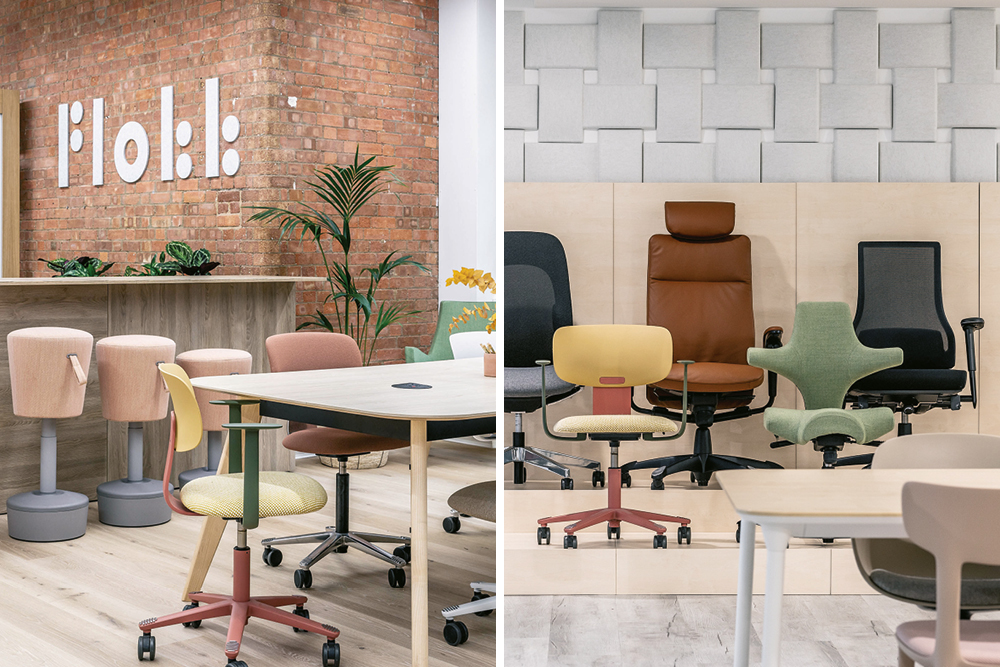
Are they really pioneers?
As Jane explains, the Norwegian furniture makers Flokk had a VP of Environment way back in 1990. They were taking sustainability seriously much earlier than other furniture companies.
“We've been pushing for quite some time the agenda to make furniture built to last, which has the lowest possible carbon footprint in production, which can also be repaired if the need arises. And you want to repair it because you want to keep it. Our partner Posturite offers spare parts, aftercare and repair teams, and a lengthy warranty on all Flokk chairs.”
“For decades for the Flokk team, it was about our own inner conviction” says Christian. “But all along, since the 1990s, we were convinced that one day this would pay off. One day there would be a real preference from furniture consumers for these sustainable attributes. And I’m happy to say we now sell well over a million pieces of our furniture – including the RH and HÅG chair ranges - worldwide every year.”
Indeed 35% of Posturite business customers said that they want to make better environmental choices when buying office furniture in a recent survey, and 6% said it was their number one priority when buying, ahead of price and design.
Which chairs at Posturite are great examples of sustainable ergonomic furniture?
“The RH Logic 200 chair by Flokk is one of the most ergonomically and technically complex chairs we make – and we still manage to surpass 60% post-consumer recycled content within it. Meaning that when you get one of these new out of the box, what you're having is 60% + waste in your hand and this is without the expense of any aesthetic or functional aspect. There is no compromise on the repairability of it, the way the chair is assembled, nor its lifetime aspect.
There are no composites in the RH Logic 200, there's no glue, and it's all pure material that can be sorted in pure material fractions at the end of its life.
This is a task chair with all the possible bells and whistles. It takes on all of your ergonomic needs and preferences for adjustability. It’s extremely smooth and frictionless. And we are just as committed to ergonomic excellence as we are to sustainability.
The HÅG Capisco range of chairs below by Flokk also has some of the very best environmental credentials in the global office furniture market.
These chairs are made from 47% recycled materials - including 97% recycled aluminum and 90% recycled Polypropylene plastic (PP). This chair range is EPD Certified (Environmental Product Declaration) and holds multiple environmental certificates including Greenguard Gold.
A Capisco chair for your office is built to last – it’s designed for disassembly, allowing for repairs and refurbishment to last a lifetime – and boasting a 10-year warranty as standard.”
Is there more of a passion for preserving the environment in Norway than in the UK?
I was expecting a resounding ‘yes!’ from my Norwegian interviewee…
But Christian says “We have a nature-loving culture in Norway. Although I don't think we should be too cocky! Because it's a mixed picture on a national level. We’re good at harnessing natural resources, we have 100% renewable energy in our electricity grid in Norway and hydro power at large. On the other hand we’re the fifth largest producer of oil globally and the third largest producer of natural gas – and these don’t come without responsibility.”
In fact, I was surprised to see that the UK is number 2 on the 2022 Environmental Performance Index created by researchers at Yale and Columbia universities, just behind Denmark, and Norway is number 20. What about Earth Overshoot Day (marking the date when demand for ecological resources and services exceeds what earth can regenerate in that year) data for both nations? In Norway this fell pretty early on April 12 in 2023 and similarly early for the UK - May 19. Globally for all nations, Earth Overshoot Day falls on August 2. It’s alarming information.
In London, Jane is hearing a strong desire from customers to have the option to make responsible purchasing choices. “In the UK we're a long way behind Norway in terms of our government policy on renewable energy and more, but I’d say consumers are just as switched onto sustainability as in Norway.”
What about the people who don't have a conscience about the environment?
“I guess we have to regulate so that they can't buy the rubbish stuff. As we approach 2030, legislation is going to come down hard. So either we take the optimistic stance and act now to be proactive, or we can wait to wait for the whipping. At the COP 28 Climate Summit a couple of days ago, it was acknowledged that the progress is going to be too slow, and legislators will have to come down increasingly hard.”
Christian from Flokk urges us to buy furniture for the long term and check how it was produced. He explains that if he were to invest in an iconic piece of furniture that he really loved and then use it for the rest of his life, a strong benefit might come in 15 years when he might otherwise have replaced it.
But! “That’s all well, but we don't have 15 years, do we? We have now six or seven years until we have to be 55% down on carbon emissions. So we need to have both longevity and low-carbon production in mind when buying furniture.”
Appreciating the value of waste
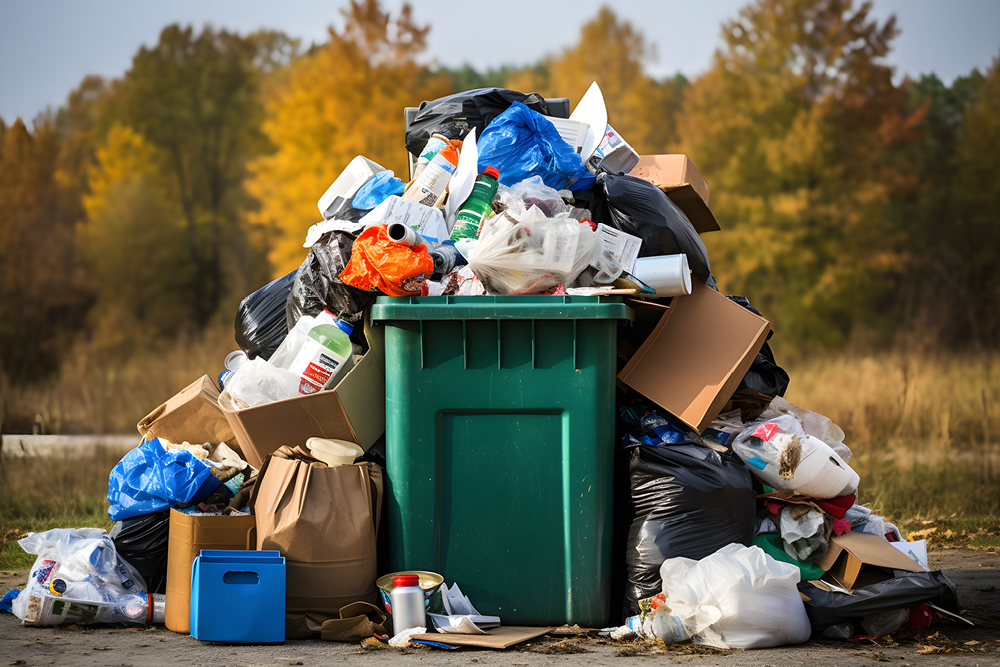
The materials that the furniture design team at Flokk are most excited about are those that have been used previously. This is ‘waste fraction’ and would otherwise have gone to landfill.
OK this is cool – recycled snow plough markers are now being used in the manufacture of Flokk chairs! In Norway, a massive 190 tonnes would go to landfill every year as these sticks only last 3 winters, and Flokk said ‘we'll take it all!’.
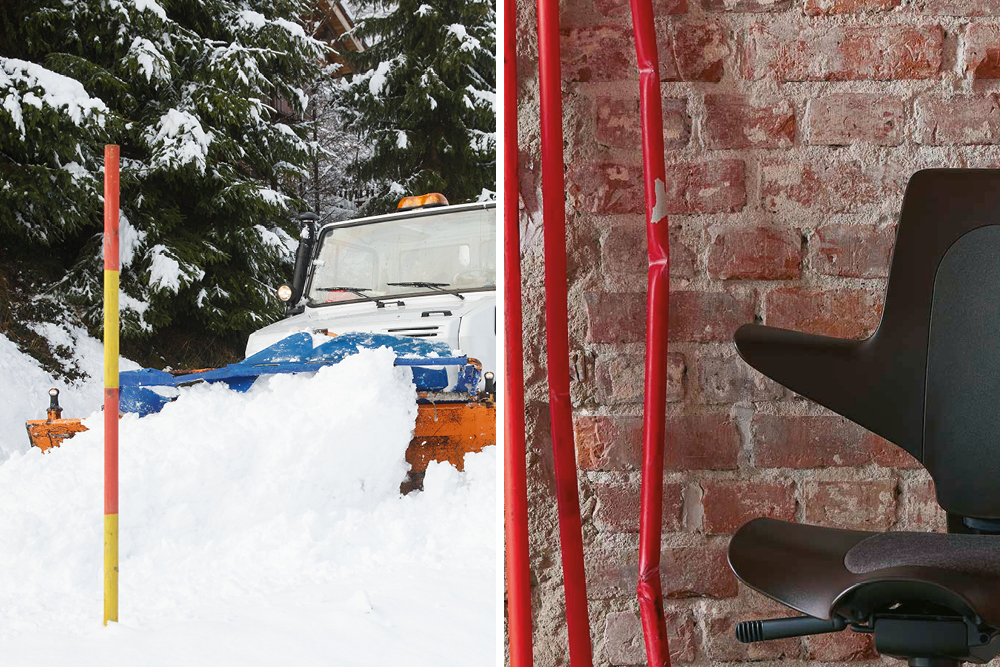
And the majority of Flokk’s recycled materials used for chair manufacture is European household waste. It was formerly plastic objects such as waste bins, buckets, containers, bottle caps, pieces from car interiors - all sorts of things.
“We sort it and process it in the south of Sweden and injection-mould the components in Scandinavia or Poland to be assembled in our factories. This reduced transport is the better way to narrow the value chains and that’s a good thing.”
Flokk also use recycled aluminium, which I’m told recycles very well and this is used for structural elements of the chairs such as the component that connects the seat to the backrest and parts of the movement mechanism casing which allows you to rock in the chair.
The aesthetic which celebrates the material and doesn’t hide it away is enjoying prominence in furniture design right now. People want to relate to how furniture is made. “Be honest and show your nuts and bolts!” advocates Christian.
Jane adds: “The sustainable materials we use at Flokk are the product of years and years of experimentation behind the scenes. My favourite material in our ranges is the tumbled aluminium and there is nobody else using it that I know of in our industry. It's like looking at marble with fossils in it and it makes you want to touch it. Imperfection can be very beautiful and sometimes perfection can be a bit boring! People are very receptive to these ‘sexy sustainable materials’ and they are so much more interesting because there’s a story in what you're looking at.”
Genuine sustainable furniture experts
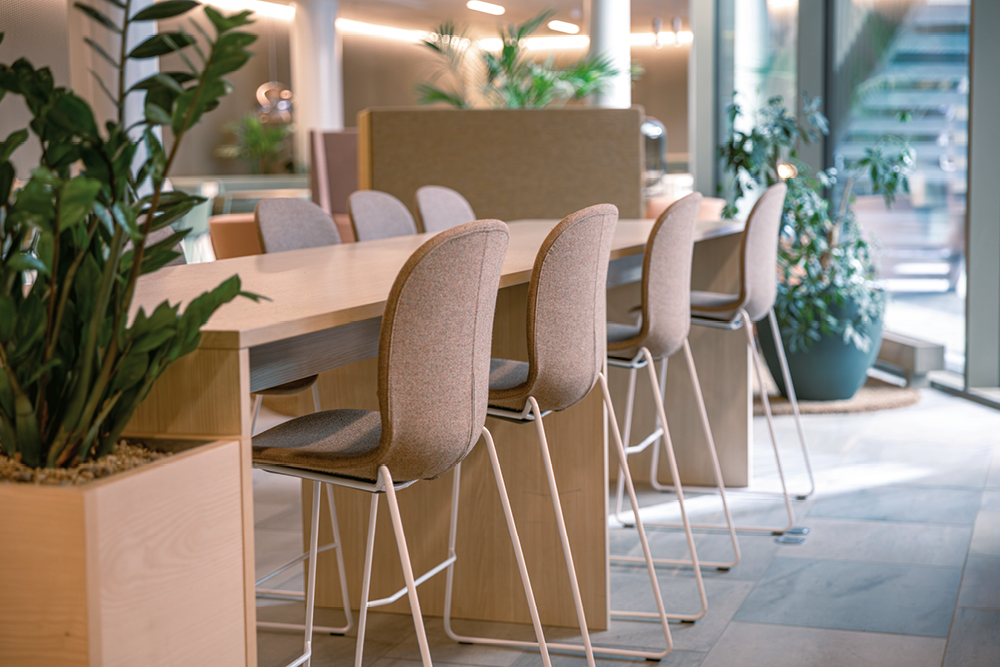
I reckon I can spot a ‘Greenwasher’ when I see one. And there are no false or flimsy nods to the environment here with the Flokk furniture designers.
As Flokk themselves say:
“Our chairs are rubbish... and we couldn't be prouder.”
Look out for part 2 in this series out soon! We’ll explore what a low carbon footprint really means in the office furniture industry and how businesses can lower their own carbon footprint when they equip their teams.
Thank you to Christian Lodgaard, Chief Design Officer, and Jane Thomson, Brand and Sustainability Ambassador, at Flokk for shedding such fascinating low-energy light on the Flokk approach to sustainability in this article.







